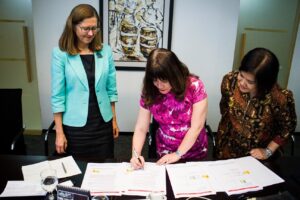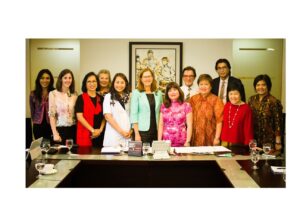In an interview with Women Icons Network, Investing in Women (IW) CEO, Dr Julia Newton-Howes, shared an overview of IW’s work and its response to the COVID-19 crisis, as well as insights on the impact of the pandemic on gender equality.
Below are the interview questions, with Julia’s responses.
Could you tell us about the genesis and early days of Investing in Women?
The Australian government recognises gender equality as an important factor in promoting inclusive economic growth and advancing women’s economic empowerment. In 2016, Investing in Women (IW), an initiative of the Australian government, was established to improve women’s economic participation as employees and as entrepreneurs in the Philippines, Indonesia, Vietnam and Myanmar.
IW focused on the following in its first phase: Business Partnerships, where we worked with large companies in target countries through business coalitions to eliminate barriers to women’s equal opportunity in large formal workplaces; Impact Investing, where we worked directly with investors so that women-owned and women-led SMEs could have better access to capital; Advocacy and Communications, which was focused on evidence-based advocacy around the benefits of gender equality; and Government and Partnerships, where we supported governments in changing laws and regulations that discriminated against women.
How does Investing in Women operate in the four countries?
Our role has always been to identify local leaders who are truly committed to promoting gender equality and advancing women’s economic empowerment. We support these leaders as partners who can inspire and initiate change. We provide them with support through funding, tools and operational guidance. IW recognises that all women, regardless of social status or economic standing, are affected by gender discrimination, and breaking the structural barriers that limit women’s economic opportunities is crucial to economic growth and business competitiveness. Women are a critical part of the workforce; as well as entrepreneurs who can start, manage and grow their own businesses, creating jobs and other opportunities in the economy.
Could you give our readers some insights on the current progress of the entire initiative?
We have slightly modified our scope in the second phase, focusing on Workplace Gender Equality (WGE), Impact Investing and Influencing Gender Norms (IGN). We have also had to shift gears in light of COVID-19 and adjust the program to adapt to the particular restrictions and challenges that have emerged in the COVID-19 environment.
Since March 2020, our research efforts have been devoted to understanding the impact of COVID-19 on companies and on employees. As a matter of fact, we have recently released reports on the crisis’ impact on the private sector, as well as on income opportunities and housework patterns given lockdown measures and remote work arrangements.
In the past months, we have worked with business coalitions and other partners to develop online resources and tools, and conduct virtual workshops and forums that can better equip both employers and employees for changes resulting from the crisis, for example by providing support for flexible work arrangements. We continue our efforts to analyse how behaviour, gender roles and social norms affect women’s and men’s economic choices, inadvertently limiting their economic participation. Through our new IGN partners, we hope to shift the mindset of women and men with regard to gender norms that hinder their economic growth.
Investing in Women has also launched the RISE Fund–Responsive Interventions Supporting Entrepreneurs–to assist in the recovery of women’s SMEs in the South East Asian region. Through the RISE Fund, we are supporting our impact investing partners to provide well-targeted funds to women-owned and women-led businesses whose limited access to capital has restricted the growth, and more recently, operations in the middle of the pandemic.
How has the pandemic affected the momentum for gender equality?
It is important to understand that in many areas, the impacts of this pandemic are different for women and men. For example, the move to lock-down countries and have families stay at home has created an increase in unpaid work, additional cooking, cleaning and childcare. Traditionally, all this is viewed as women’s work and there is evidence that women have taken up the majority of this additional work, sometimes while also having to do paid work from home.
Segmentation of labour markets also play an important role. As we all know, many people have strong views about what jobs are suitable for women or for men. Women are over-represented in lower paid occupations and many of these have been hit hard in this crisis: retail, travel and hospitality.
Overall, there is a very significant risk that COVID-19 will reverse progress towards gender equality. But there are also clear opportunities emerging. One example is that the lockdowns have been an opportunity to rethink workplaces and question rigid work practices. Greater flexibility around working from home will benefit women. Having men at home is also an opportunity to demonstrate greater sharing of unpaid care work. Let’s make sure we make the most of the opportunities this crisis presents, because more gender equality is good for society and the economy.
Currently, there are quite a few initiatives for creating gender-equal places of work. How do you think they could work together to achieve the 2030 goals?
We see other organisations and programs as partners in creating gender-equal places of work, and our efforts in Investing in Women are meant to complement theirs, whether in the form of data, tools, reports and other resources. It’s never been about competition; it’s about how we how we recognise each other’s strengths and support each other towards gender equality. We have a common understanding that we should all work together to achieve the 2030 goals, and we are supportive of one another in achieving them.
This interview originally appeared on the Women Icons Network website. Minor revisions have been made.




